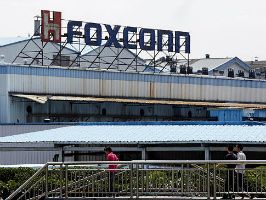Among the most famous quotations from the works of Oscar Wilde is the quip in Lady Windermere’s Fan that a cynic is someone who knows the price of everything and the value of nothing. We tend to concentrate rather a lot on the price of things nowadays. Hardly surprising, given the times we live in, but there is an argument for saying that we are losing appreciation of the value of them in the process.
This was brought to mind, in a rather roundabout way, by the news of a mass brawl at one of Foxconn’s plants involving 2,000 workers that led the factory to be closed for a day. Foxconn is the Taiwanese electronic manufacturing company with 13 factories in China and plants in other parts of Asia that provide a lot of the manufacturing for a number of computer companies. The most high profile of these is Apple but Foxconn also includes Dell, HP, Cisco, Intel, Nintendo, Microsoft, Sony and Toshiba among its major customers.
Why did I make this link? The growing reliance of major vendors on Foxconn to manufacture parts, components and products on their behalf is down to one factor: cost. It’s all part of the longstanding shift of production to markets and countries where labour costs are significantly cheaper.
One unintended consequence of this shift, however, has been the increased risk to production and product supply from basing factories and plants in areas where severe weather events and natural disasters, such as the floods in Thailand last year, are far more common than in Europe or the US, or where conditions are so Dickensian that fights might break out among the workforce.
On the surface, the relocation of production to less developed countries has resulted in a reduction in the price of IT products such as PCs, notebooks, hard disk drives and other components. But I think this is having an interesting effect on our attitude towards technology as a consequence. Our appreciation of the value of that technology has diminished as it has become more and more of a commodity. It’s not unusual, for example, to hear people say it can be cheaper to replace a PC with a new one than to repair it.
We are moving to a disposable culture. Mobile phones are being replaced at shorter and shorter intervals as networks exhort people to upgrade and replace existing phones irrespective of their need to do so. Often, what provides the momentum for this churn is the promise of more features at the same price or a lower one.
The industry tries to compensate for the decline in the price of hardware by stressing the value of the software and services around it. For many, this seems a viable way forward. But I wonder long-term what kind of value customers will attach to the software and services if their perception of the value of the hardware it sits around is reducing all the time.
One significant by-product of the so-called bring your own device (BYOD) phenomenon could be a big increase in the turnover of devices. In contrast to the traditional model where an employer might upgrade IT equipment very three years or more, people are much more likely to upgrade their own smart phones or tablets far more frequently. While many employees will be happy that they are able to change their chosen devices much more regularly than their employer would have allowed, it could reduce the value of their “workplace” device if it’s something they can replace on a whim.
I’m aware the point we are moving towards is one where the value is in the consistent “user experience” delivered by the employer, irrespective of the device it runs on, but the irony is the value the user attaches to that experience could diminish over time as it becomes just a small and easily transferable part of their daily IT ecosystem.
The channel has had to grapple with the price/value dichotomy for years. To date, it has managed to keep just the right side of the line to earn a pretty decent living. To slightly amend Wilde, successful channel partners are people who know the price of everything but they also know its value too.







Subscribers 0
Fans 0
Followers 0
Followers